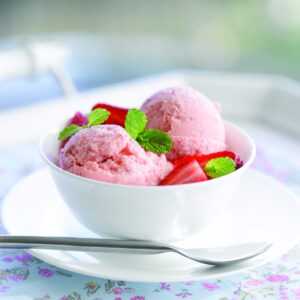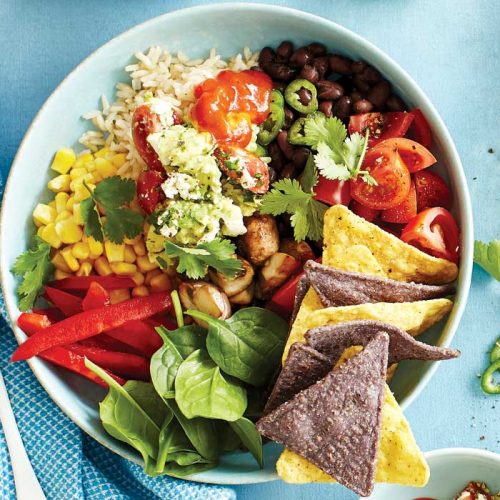
Travelling can be fun and exciting, or really hard work. We share tips on how to stay healthy when you’re away from home.
Whether you jet round the world on brain-busting business trips or test your sanity driving on a family holiday, eating healthily can be a real challenge.
Somehow you can always remember to book flights, pack your toothbrush and arrange for someone to feed the cat, but when it comes to food it’s another story.
I have just returned from a trip to Australia where my healthy habits were put to the test. I spent two hours killing time at the airport surrounded by milky coffees and mega muffins.
On the plane I was greeted by greasy pastry, and on arrival in Sydney there were about 10 chocolate-filled vending machines: a potential disaster.
Nearly a whole day where the most exercise I did was stepping onto the escalator and I could have eaten more food than I would need if I was running a marathon!
It can be easy to put healthy eating in the ‘too hard basket’, but if travel is a regular part of your life, what you eat and drink can have a huge impact on your weight and health as well as leaving you short of valuable nutritious foods, particularly fruit and veg.
With a little pre-planning you can keep yourself healthy. From now on, make it your mission to pack your healthy habits when you’re travelling:
- Start your day the healthy way with a nutritious breakfast.
- Aim to keep your meal pattern similar to a normal day. Have regular meals and healthy snacks to give you energy to stay awake and alert.
- Carry nutritious snacks to keep temptation at bay. They can provide your body with valuable carbohydrate, fibre, vitamins and minerals.
To maintain a steady weight you eat the same amount of kJ/day that you burn by living, breathing and being active. But when you travel, it is easy to take in a lot more energy (kJ) than usual because of extra snacks, larger portions and unhealthy food choices.
At the same time, you are likely to be less active than normal and therefore burning up less kJ. An extra latté, glass of wine, packet of chips and scoop of ice cream every day for a week adds up to a whopping 18,000kJ.
That’s the same amount of energy you might normally have in all your food over two days!
How to eat when you’re away from home
Being away from home – even if it’s in New Zealand – changes your access to food and can result in an increased reliance on fast food and restaurants.
It can be helpful to familiarise yourself with your destination before you go. Look on the internet, in a travel guide, or call your accommodation to find out where the nearest supermarket is, what types of restaurants are in the area, and what food is available at your accommodation.
If you are self-catering
Plan your meals before you go, take a shopping list and buy food when you get there. Quick meals you can make yourself include:
- Fresh pasta and tomato-based sauce with salad.
- Quick-cook rice (or rice blend) with grilled or microwaved fish, and broccoli steamed in a microwave or a bag of mixed salad leaves and a sliced tomato.
- Wraps/pita bread/bagels/panini toasted, stuffed or topped with flavoured tuna or lean meat with salad and hummus.
- Baked potato cooked in a microwave with baked beans or cottage cheese and salad.
- Canned vegetable/lentil soup with whole grain bread and a low-fat yoghurt.
- Hot chicken with skin removed, served with a drained can of chickpeas and corn, served with mixed salad leaves.
- Noodles with frozen veg mix with a stir-fry sauce and shredded rotisserie chicken (skin removed) and use the remaining chicken to make sandwiches, wraps or salads.
- Mini pizza: pita bread/English muffins topped with sachet of ketchup, slices of tomato, mushrooms and grated edam cheese.
If you are in a motel or hotel
Buffet meals: Have a good look at everything available before you make a decision: if it’s breakfast time, choose the cereal, fruit and yoghurt option or make healthy choices from the cooked breakfast selection rather than having both.Whole grain toast, boiled or poached eggs, baked beans, grilled tomatoes and mushrooms is the way to go. Watch for hollandaise, deep-fried potatoes, fried bread and sausages – all that extra fat makes them high kilojoule.
Mini bar: If you are offered a mini bar key, you can decline it. Alternatively you can request that they remove the chips and chocolate.
Facilities: Take advantage of accommodation facilitates like a pool or gym. Explore the area by walking or running rather than relying on a tour bus. Incorporate activity into your daily plan – pack your trainers and shorts and a t-shirt.
If staying with family and friends
Offer to share the cooking and shopping so that you have some control over meals served.
www.healthyfood.com










